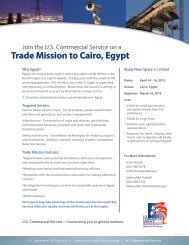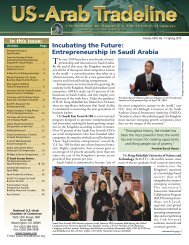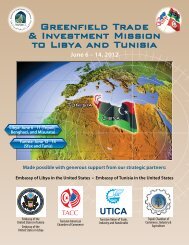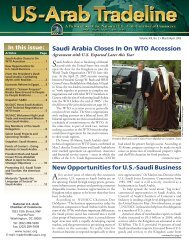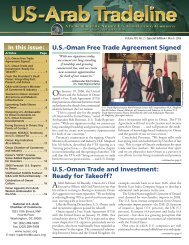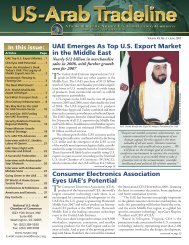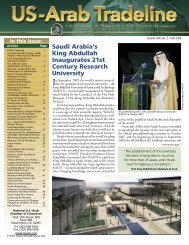Qatar - National US-Arab Chamber of Commerce
Qatar - National US-Arab Chamber of Commerce
Qatar - National US-Arab Chamber of Commerce
Create successful ePaper yourself
Turn your PDF publications into a flip-book with our unique Google optimized e-Paper software.
Ministry <strong>of</strong> Energy and Industry:<br />
A Reliable Partner in a World <strong>of</strong> Change<br />
<strong>Qatar</strong> has established a solid reputation<br />
as a very reliable supplier <strong>of</strong> energy,<br />
commented the Minister <strong>of</strong> Energy and<br />
Industry, H.E. Mohamed bin Saleh Al-Sada,<br />
during the 3rd Doha Energy Forum on March<br />
8, 2011. Minister Al-Sada had been in the job<br />
for only seven weeks when he gave that speech<br />
in Doha, but he is a seasoned veteran when<br />
it comes to “on the job” experience with <strong>Qatar</strong>’s<br />
energy policies. Prior to his appointment as<br />
Minister on January 18, 2011, he served as<br />
the Minister <strong>of</strong> State for Energy and Industry<br />
Affairs since 2007.<br />
“We need to emphasize the efficiency,<br />
reliability, and safety <strong>of</strong> our production<br />
facilities,” says Minister Al-Sada. “We need<br />
to look at further exploration, and this is what<br />
we have been doing now by <strong>of</strong>fering new<br />
acreage for exploration in both oil and gas.<br />
We really think the potentiality <strong>of</strong> adding to<br />
our reserves is there,” he adds, noting that<br />
known reserves will also be enhanced by<br />
upgrading existing production wells with new<br />
technologies in exploration and seismic studies.<br />
Partnerships with international oil companies<br />
(IOCs) play an important role in developing<br />
and sharing these new technologies, says the<br />
Minister. He contends that international oil<br />
companies (IOCs) and national oil companies<br />
(NOCs) have the same target – the development<br />
<strong>of</strong> energy resources.<br />
Commenting on future<br />
trends, Minister Al-Sada<br />
notes that energy demand<br />
is now being driven by the<br />
Asia-Pacific region. “There<br />
is a shift in energy markets<br />
from West to East, and it<br />
is a reality,” he notes. “The<br />
Ministry <strong>of</strong> Energy and<br />
Industry tracks centers <strong>of</strong><br />
growth and in 2009, about<br />
60 percent <strong>of</strong> <strong>Qatar</strong>’s<br />
liquef ied natural gas<br />
(LNG) moved to the East.”<br />
The Ministry is seeing increased requests<br />
for LNG regionally as <strong>Arab</strong> economies ramp<br />
up their industrial outputs and upgrade their<br />
public services for locals and visitors alike.<br />
<strong>Qatar</strong> recently signed a deal with Dubai,<br />
building on the success <strong>of</strong> the Dolphin Gas<br />
Project, the GCC’s first cross-border refined<br />
Minister <strong>of</strong> Energy and Industry,<br />
H.E. Mohamed bin Saleh Al-Sada<br />
gas transmission project and the<br />
largest energy-related venture ever<br />
undertaken in the region.<br />
The Ministry oversees the development <strong>of</strong><br />
<strong>Qatar</strong>’s energy sector and industrial infrastructure<br />
with the objective <strong>of</strong> creating a<br />
diversified and sustainable 21st-century<br />
knowledge-based economy.<br />
The Government’s industrial<br />
strategy focuses in<br />
part on utilizing its natural<br />
resources to the highest<br />
capacity, encouraging<br />
increased foreign investment<br />
and <strong>of</strong>fering incentives<br />
to enhance private<br />
sector contribution in the<br />
industrial sector.<br />
<strong>Qatar</strong>’s LNG production<br />
reached 77 million metric<br />
tons per year (Mta) in 2010,<br />
a major milestone. (See related story on page 19.)<br />
To go from scratch to number one in the world<br />
in less than 15 years is a monumental achievement,<br />
one that reflects years <strong>of</strong> investment in<br />
infrastructure and expertise.<br />
“This was a major accomplishment,”<br />
confides Minister Al-Sada, and “<strong>Qatar</strong> has<br />
many milestones yet to come.”<br />
<strong>Qatar</strong> Central Bank: Promoting<br />
Prudence in Uncertain Times<br />
In November 2010, <strong>Qatar</strong> became the first<br />
<strong>Arab</strong>ian Gulf nation to be included in the<br />
International Monetary Fund’s (IMF) annual<br />
Article IV Consultation Concluding Statement.<br />
According to the IMF, “<strong>Qatar</strong> has weathered<br />
the global financial crisis exceptionally well,<br />
reflecting the quick and strong policy response<br />
by the authorities. Growth has rebounded and<br />
is projected to accelerate to 20 percent in 2011,<br />
while inflation will remain subdued.”<br />
The IMF Statement said <strong>Qatar</strong>’s “analysis<br />
<strong>of</strong> the banking system risks and the candid<br />
presentation <strong>of</strong> the results demonstrate a clear<br />
commitment to monitor potential risks.” The<br />
IMF Statement goes on to say that <strong>Qatar</strong>’s<br />
“banking system is resilient to credit and market<br />
risks based on the mission’s stress tests.”<br />
This ringing endorsement by the IMF can<br />
be largely chalked up to the work <strong>of</strong> H.E.<br />
Sheikh Abdullah bin Saud Al-Thani, Governor<br />
<strong>of</strong> <strong>Qatar</strong> Central Bank (QCB). A former<br />
Chairman <strong>of</strong> the State Audit Bureau and<br />
currently serving as Chairman <strong>of</strong> the Board<br />
<strong>of</strong> <strong>Qatar</strong> Development Bank and a member<br />
<strong>of</strong> the Board <strong>of</strong> <strong>Qatar</strong> Investment Authority,<br />
Sheikh Abdullah has long adhered to only the<br />
most prudent banking practices.<br />
Under his leadership, <strong>Qatar</strong> has seen some<br />
notable firsts in recent months:<br />
• In October 2010, the QCB published its<br />
first Financial Stability Review, which presents<br />
an objective assessment <strong>of</strong> the risks and<br />
vulnerabilities to <strong>Qatar</strong>’s financial system,<br />
as well as an evaluation <strong>of</strong> the nation’s<br />
capacity for coping with such risks.<br />
• In November 2010, <strong>Qatar</strong> became the first<br />
GCC country to authorize mobile money<br />
transfer and payment services in direct<br />
collaboration with banks and exchange<br />
houses licensed by <strong>Qatar</strong> Central Bank. The<br />
mobile payment feature can be used to pay<br />
for services provided by public institutions,<br />
companies and other enterprises, thereby<br />
enabling consumers to transfer funds through<br />
local telecom operators.<br />
• In February 2011, the QCB directed <strong>Qatar</strong>i<br />
banks to stop opening new Islamic branches,<br />
accepting Islamic deposits, or dispensing<br />
new Islamic finance operations. The move<br />
was taken in response to difficulties faced<br />
H.E. Sheikh Abdullah bin Saud Al-Thani, Governor <strong>of</strong><br />
<strong>Qatar</strong> Central Bank (QCB)<br />
by conventional banks in separating Islamic<br />
and non-Islamic activities, thereby complicating<br />
these banks’ ability to manage risks<br />
properly. By segregating conventional and<br />
Islamic banking activities, the QCB will be<br />
able to maintain a systematic framework <strong>of</strong><br />
liquidity management and improve the<br />
efficiency <strong>of</strong> open market operations.<br />
• In March 2011, the QCB launched a new<br />
credit bureau, which will help to support<br />
the sustainable growth <strong>of</strong> credit in <strong>Qatar</strong><br />
and will provide the banking sector with<br />
analytical data to support advanced risk<br />
management techniques.<br />
The QCB, concluded Sheikh Abdullah,<br />
“considers the importance <strong>of</strong> establishing the<br />
<strong>Qatar</strong> credit information central to preparing<br />
sound credit policies, making correct credit<br />
decisions, and reducing the risks <strong>of</strong> funding.”<br />
<strong>US</strong>-<strong>Arab</strong> Tradeline • Spring 2011 9



